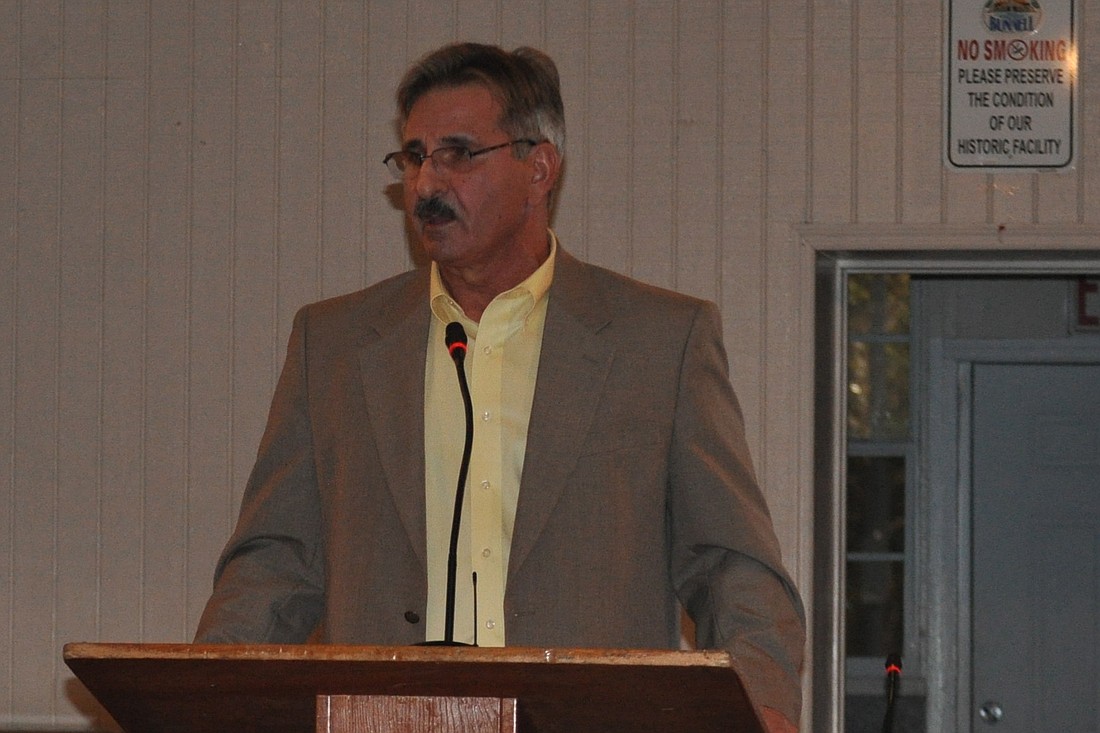- February 28, 2025

Almost everyone at Wednesday's meeting in Bunnell’s City Hall agreed: The residential jail-diversion program proposed by Grace Tabernacle Ministries' Pastor Charles Silano sounds great — but they don’t want it in their backyard.
“What the pastor is doing is a good thing, but we don’t need it in Bunnell,” Bunnell resident Pauline Mitchell said. “Nobody wants to live in front of that.”
The special meeting — attended by about 40 people, including Bunnell Mayor Catherine Robinson, Vice Mayor John Rogers and commissioners Bill Baxley and Jenny Crain-Brady — was Silano’s chance to make the case for the Open Door Recovery program, which he said would serve only non-violent and carefully vetted substance-abuse offenders.
“We will not be taking just any person who just wants a prison-diversion program,” he said. “It’s someone that needs recovery. It’s someone that has an addiction that they need to get free of.”
The program would be housed on the city’s south side, at 309 E. Booe St., where Silano said residents, who would be court-ordered into the program, would be tested weekly for drugs and monitored 24 hours a day. There would be security cameras and random visits by police officers with drug-sniffing dogs, he said.
But the people in program would not be dangerous, Silano said.
“An addict who is out on the street is one thing, but a person who is in recovery is another thing all together,” he said. “We’re turning people out whose lives have been transformed, or, at the very least, they have achieved sobriety. And that’s huge.”
The program would be Christ-centered and modeled on a successful program called Friends of Sinners in Kentucky, Silano said. That program, he added, has about a 70% success rate.
Joyce Severin, a Bunnell resident who said she’s worked as a substance-abuse counselor for 20 years, said she thought the program would work. But she didn’t want it in residential Bunnell, either.
“I believe it would work, but we don’t need it here. We need help to clean what we have,” she said. “If there’s an issue where you have to have cameras and dogs, it’s in the wrong place. Take it someplace else.”
Palm Coast resident Sandra Stubbs spoke in favor of the program.
“My sister just celebrated 10 years clean, and she went through a program that was in a community,” Stubbs said. “Yes, these are people who have issues, but let us not forget, they are people. So I ask that you please, ask compassion to speak to your hearts.”
Commissioner Jenny Crain-Brady said she was struggling with the issue.
“There’s not a person in this room that doesn’t have someone in their family who has been affected by drugs or alcohol,” she said. “These people are doing the right thing. Their heart is in the right place. My huge trouble is forcing something on the community that the community is rejecting. Because it sets a precedent.
She also questioned the wisdom of placing the residential center in an area that has had problems with drug crime.
“Why bring people that are struggling with addiction to the candy store?” she said. “Is it fair to bring the people that you’re trying to divert from being an addict to an area where they can go down the street, they can go around the corner, and it’s there?”
The Rev. Sims Jones said he’d spoken to his congregation about the program — which he thinks is a good one — but had gotten mostly negative feedback.
“I sat down with Charlie Silano for a good couple hours, and I even brought some of the issues to the people. And the people told me, ‘Not in this community,’” he said. “If we go against the people in Bunnell, it’s slapping them in the face, it’s slapping them upside the head. Then you’re going to have real problems.”
After the meeting Wednesday, Silano said that initial reaction to a proposed jail-diversion program is almost always, ‘Not in my backyard.’
“But the question is, where, and when?” he said.
Some residents’ concerns — for instance, that people would be bussed to the program from Volusia County, or that they’d arrive desperate for a fix — are unfounded, he said. The program would only accept Flagler County individuals court-ordered there, he said, and they would go through a detox program first.
Having the program in a community, instead of isolated in an unincorporated area on the outskirts of town, is vital to its participants, he said. “Community support is huge for a program like this,” he said. “If we don’t believe in re-entry, what are we telling them?”